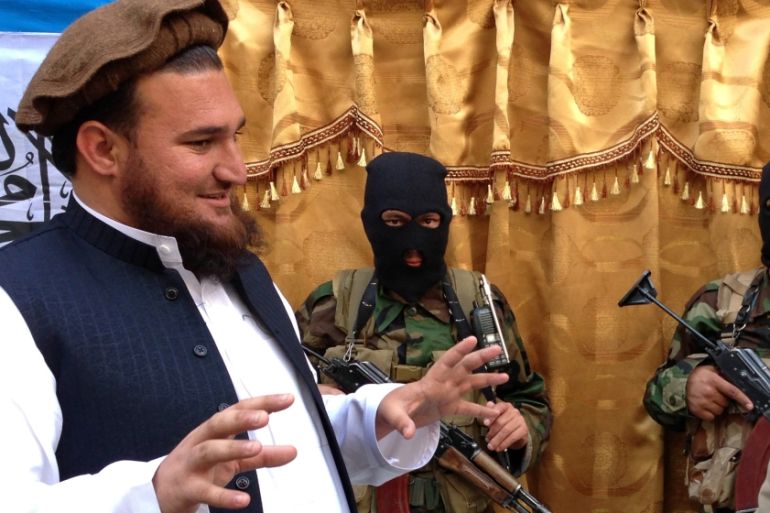Pakistan confirms escape of ex-Pakistan Taliban spokesman
Interior Minister Ijaz Shah’s comments on Monday were the first official acknowledgement of Ehsanullah Ehsan’s escape.

Islamabad, Pakistan – High-profile Pakistan Taliban leader Ehsanullah Ehsan, who acted as the group’s spokesman and claimed responsibility for some of its deadliest attacks, has escaped from military custody, Pakistan’s interior minister confirmed, more than a week after the commander first claimed he had escaped.
Interior Minister Ijaz Shah’s comments to reporters on Monday were the first official acknowledgement of the escape of former Tahreek-e-Taliban, known by the acronym TTP, and Jamaat-ur-Ahrar (JuA) spokesman Ehsan.
Keep reading
list of 3 itemsPakistani police arrest Lashkar-e-Taiba founder
Exclusive with Hafiz Saeed
In custody since February 2017, when he surrendered to security forces, Ehsan had been held by the military and made a televised confession in April 2017.
In an audio message released on February 6, Ehsan claimed that he surrendered to authorities under an agreement, but escaped after “Pakistan’s treacherous institutions imprisoned me, along with my children”.
Ehsan confirmed the authenticity of the audio message in a phone interview with Al Jazeera. He said he had escaped in mid-January, and that he would be releasing further details “at a later time”.
Speaking on Monday, Interior Minister Shah did not directly comment on how the escape occurred, but when asked if Ehsan had indeed escaped, he said: “This is correct, that is correct.”
Pakistan’s military, in whose custody Ehsan had remained since his arrest three years ago, did not offer comment.
Whereabouts unknown
The Pakistan Taliban has been fighting the government since 2007, carrying out scores of deadly suicide bombings and other attacks on civilian and security targets. Ehsan split from the organisation in August 2014, joining breakaway faction JuA, led by former Pakistan Taliban commander Umar Khalid Khorasani.
JuA also carried out a number of high-profile attacks, including high-casualty attacks targeting a Pakistan-India border crossing, Christian churches and an Easter celebration in Lahore and on mosques, police officials and court buildings.
In April 2017, Pakistan’s military announced that Ehsan had surrendered himself to security forces, but offered scant details on the circumstances of his capture or conditions of his surrender.
|
|
On Friday, Ehsan shared an image of a document he claimed was part of his surrender agreement. The document says he was guaranteed immunity from prosecution, would be held in a “secure location” and provided a monthly stipend.
Pakistan’s military did not respond to a request for comment on the alleged agreement. The military has claimed it would prosecute Ehsan in the past, but no cases or court proceedings were initiated during the period of his incarceration.
In his audio message released earlier in February, Ehsan said he fled captivity along with his family because the military violated the agreement.
“We bore the difficulties of imprisonment for three years with great patience, but eventually we were forced to plan our escape from there,” he said.
Asked via telephone in what ways the agreement was violated, Ehsan said he would divulge further details “later”.
He did not provide details on how he escaped from prison or his current whereabouts.
Ehsan’s surrender came at a time corresponding to a drop in violence in Pakistan, after the military undertook widespread security operations across the country – particularly in the northwestern districts where the Pakistan Taliban and its allies were based – to root out the group.
Today, the military says the majority of the Pakistan Taliban fighters have been displaced into eastern Afghanistan. Violence has dropped sharply, but sporadic attacks targeting both civilians and security forces continue periodically.
Asad Hashim is Al Jazeera’s digital correspondent in Pakistan. He tweets @AsadHashim.